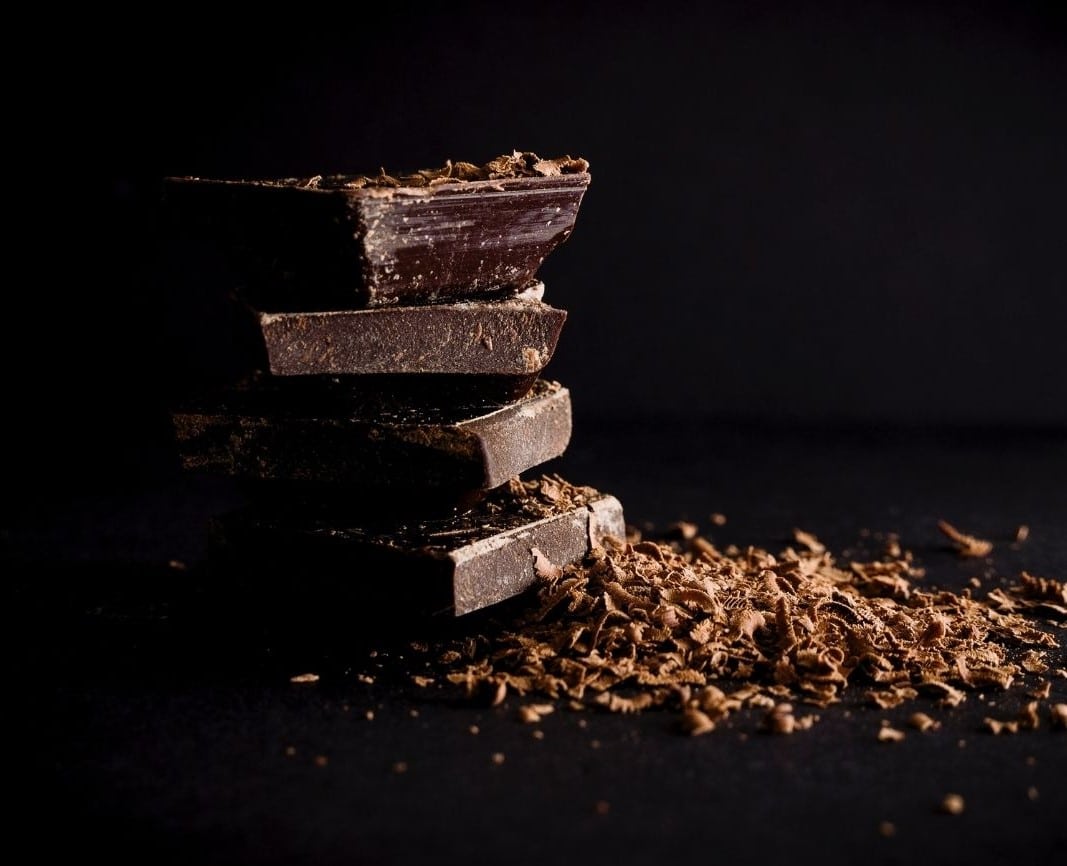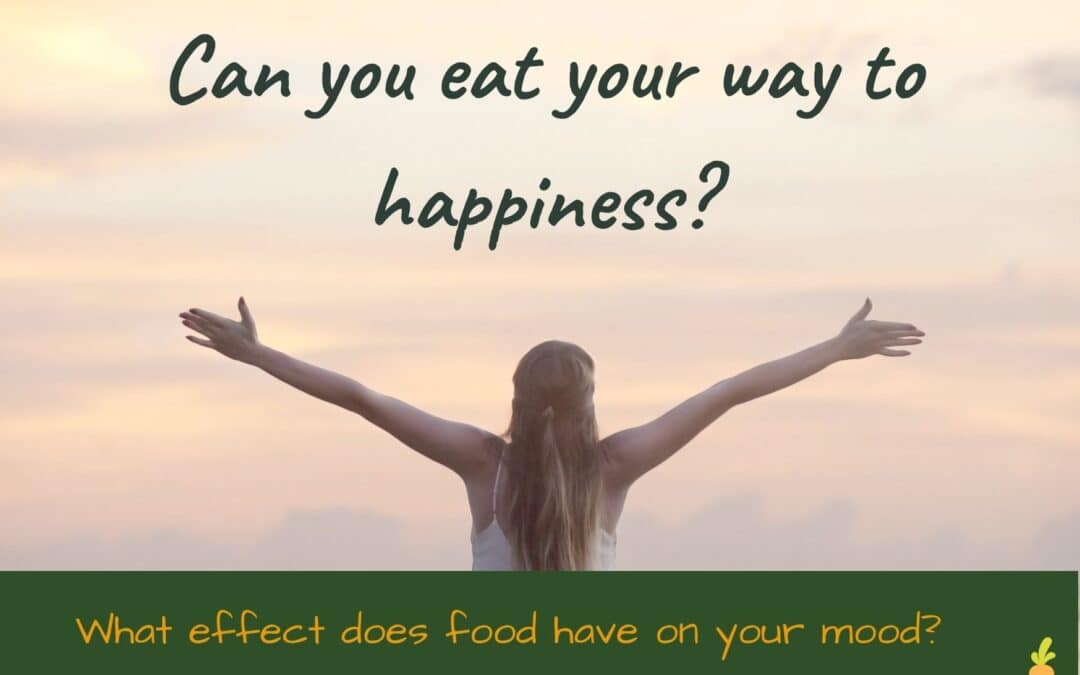Things have been pretty tough for many people over the last few years, whether it be the isolation and fear of lockdown, the increasing pressures of our modern lives or anxiety over the state of the planet. Many of us are experiencing difficulties with our mental health, from more meh days than we’d like, to full blown depression and anxiety. Not fun.
Whilst it seems like a lot of the things that affect our moods are out of our control, there are a few things we can do to keep our mood elevated; exercise, practices like meditation, affirmations and gratitude, and trying to think positive thoughts. But have you ever wondered how your food affects your mood? Is there such a thing as eating for happiness?
Yes! Very much so. As with many conditions, how our body looks and feels on the outside is a reflection of the chemical processes on the inside. If they’re not happening in the right way, then we experience the symptoms of this. Some of these symptoms are low energy, low mood, anxiety and depression.
A little bit more of the science…
In case you’re interested, we feel good when certain chemicals are present in our brains. Chemicals like serotonin, norepinephrine and dopamine.
Dopamine causes that little happy feeling when someone likes your Instagram post, when you complete a small task or when are kind to others. It’s pretty addictive though, and the effects are short lasting… Dopamine is the instant gratification drug.
Oxytocin is released during physical contact with others (including pets). It’s the happy feeling behind love, friendship or trust. It works by stimulating dopamine and serotonin, whilst reducing anxiety. Oxytocin boosts our immune systems and gives us feelings of calm and safety.
Serotonin is also social, but is linked to pride, loyalty and status. When we feel a sense of accomplishment or recognition this is serotonin. It creates strong positive emotions. It also aids digestion, and helps bone growth and organ development. Other ways to stimulate it are bright light and sunshine and happy thoughts. This chemical is the one that is often addressed with anti-depressants.
Endorphins are released in response to pain, and help us persist with activity when we might want to give up. Taking a freezing shower can also give you an endorphin boost.

What do we experience when these chemicals are low?
It’s not all fully understood, but the following symptoms have been linked to low levels of these brain chemicals:
- Depression
- Anxiety
- Moodiness
- Aches and pains
- Addiction
- Trouble sleeping
- Impulsive behaviour
- Fatigue
- Demotivated
- Weight gain
- Aggression
- Irritability
- Withdrawing from people
- Stress
We don’t want any of these!

So what does food have to do with our brain chemicals?
Food as building blocks
If we don’t have the right nutrients in our body, then it can’t make these chemicals. We need to make sure that these amino acids are present in our bodies (through our diets).
For example, some research has found that a higher intake of tryptophan-heavy foods can help increase serotonin, because it’s an amino acid that serotonin is synthesised from. These are foods like eggs (particularly the yolks) [1], cheese, pineapples, tofu, salmon, nuts and seeds, dark green, leafy veg and turkey. These are best combined with a carb source, as insulin production promotes amino acid absorption.
Dopamine is made from another amino acid, tyrosine. This amino acid is again found in protein rich foods like turkey beef, eggs, dairy, soy and legumes. Having good levels of omega 3 fats has also been linked, so also get your oily fish and seeds. Kale, apples and bananas also contain some linked products.
Foods that disrupt the brain chemicals
Some research has found that saturated fats can disrupt signalling in the brain if eaten in large quantities. It’s early days in this study, but adds another reason to avoid binging on saturated fats! [3]. This may be because of the increase in inflammation that it causes [4].
A healthy gut
Healthy gut bacteria have been shown to play a role in serotonin levels through the gut-brain axis [2]. These gut bacteria can also produce dopamine [5]. You can do things to help increase and balance your gut bacteria like:
- eating prebiotic, high fibre foods like oats, wholegrains, beans, legumes, peas, most vegetables, berries, bananas
- eating probiotic foods like live yoghurt, sauerkraut, kimchi, komboucha and kefir
- eating a variety of foods to support lots of different bacterial populations
- Having a bone broth every now and then
- Drinking Aloe Vera are also really healing (Aloe Vera was my saviour a few years ago!).
- Avoiding artificial sweeteners, trans fats and processed and refined sugars will also help.
Eating the right fats
Omega 3 fats are believed to help brain function and particularly the communication of serotonin and dopamine. The best sources are oily fish (from sustainable sources please – look for the MSC label), seeds like chia and flax and walnuts.
Avoiding energy lows
Managing your blood sugar levels can help promote a level mood, we’re all more cranky when our blood sugar levels are low and we’re ‘hangry’. Do this by avoiding white, processed grains and products with added sugar, and going for wholegrain, protein and fat rich, high fibre foods.
Eat regularly to avoid energy dips. Keep healthy snacks on hand like fruit and nuts.
Drinking water and avoiding dehydration can also help to avoid slumps in energy.
Eating for pleasure
Eating foods that you love, like chocolate and wine, can produce endorphins. This is fine if it’s coming from a healthier source like dark chocolate or red wine, or as an occasional treat. Don’t fall into the trap of enjoying it regularly. You’ll need to consume more as it won’t have the same effect and it won’t do your health any favours. Great for an occasional lift though.

Foods to regulate inflammation
Chronic inflammation is a major issue for many of us and yet so unknown! It has been linked to some forms of depression, increases stress levels and interferes with chemical processes so we must work to reduce it. Avoiding inflammatory foods like processed meats, refined sugars and any allergens like dairy and gluten (if they cause an issue for you) can help, as can eating whole foods and lots of leafy greens.
What should you be eating to boost your happiness?
So to eat for happiness, you should:
- cut out refined sugars, processed meats and processed white grains
- eat a high fibre diet
- eat lots of leafy green vegetables
- eat a wide variety of foods
- limit saturated fats
- consume omega 3 fats from oily fish (MSC), seeds like linseed and chia, and walnuts
- eat enough protein (from healthy sources like eggs, oily fish, lean white meats, nuts, seeds and tofu)
- combine protein with high quality carbohydrates
- eat quality snacks, like nuts and fruit
- eat foods you love like chocolate (in moderation)
- drink enough water
- eat pre and probiotic foods, like live yoghurt and fermented foods
i.e. eat healthy!
A couple of other things to mention
It’s not all about diet. Here are a couple of other things to do to improve your mood:
- Exercise little and often to release endorphins
- Get some daylight every day, especially in the winter.
- Get enough sleep – dopamine is normally high in the morning (to make us feel alert), but if our rhythms are disrupted, by a late night for instance, it isn’t produced properly.
- Listening to music seems to increase dopamine! [6]
- Hug someone (or a pet)
- Be kind to someone, or tell someone how much you care
- Think positive thoughts

